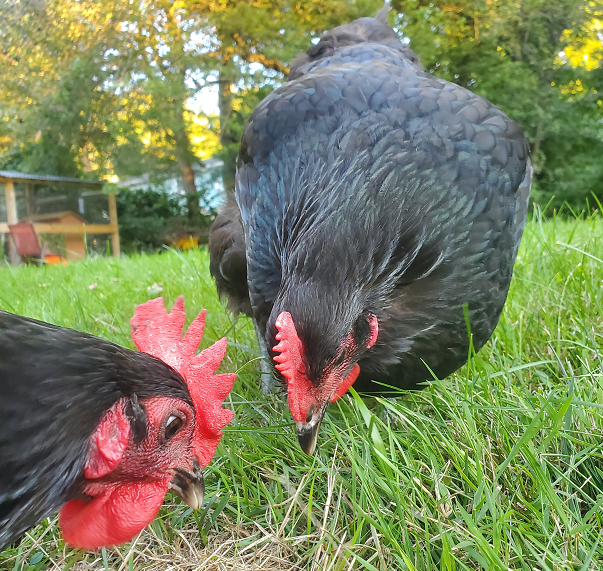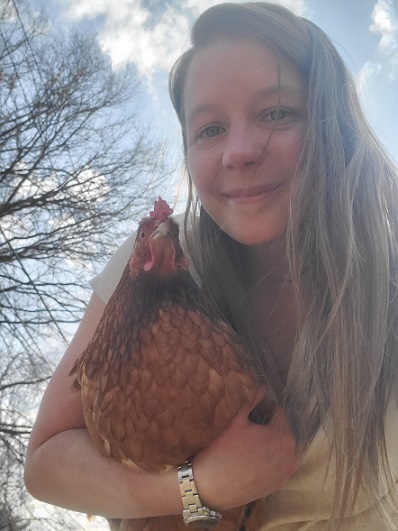I have always had a passion for animals, giant horses and cows. Dog and cats and snakes oh my! I didn’t find my true passion in life until I was 27, chickens. I spent many years researching and visiting animal sanctuaries to learn how to be a “Chicken Tender”, so to speak.
When I was finally ready, we built a chicken coop with a 16’ by 8’ run. It took almost six months but I wanted it to be safe and secure from all the hawks, foxes, skunks and bears we have. Did you know that skunks love to eat chicken eggs and have been known to attack adult hens? Strange isn’t it?! Now what type bedding should we use inside the coop, chopped hay? Hmm, but that causes breathing and stomach issues. Sand? No that causes eye irritation and breathing problems. I chose to go with straw. To know the difference between straw and hay, I revert to the old saying “Hay is for horses” which means it’s meant to be eaten. Straw doesn’t have those extra grains which cause the hens to get sick.
Now that we have everything ready after a year, it’s time to choose a type of chicken! There are over 100 variations in the world, 53 in the states alone! I wanted to raise them from hatchlings and my husband wanted to get adults so, naturally, we got hatchlings. Hatchings are also called “Day olds”. Then we transitioned to rescuing adults from the slaughterhouses and egg laying factories. When choosing the type of chicken, you must consider the weather in your area. The tri state area is in zones 7-5a. Cold hardy breeds work best! Australorps, Orphington Buffs, Rhode Island Reds, Wyandotte, Ameraucana, Barred Rocks, I could go on forever. Also to consider, is how many eggs each breed produces. For a family of 2 you don’t want 10 chickens laying eggs every day, 10 chickens times 365 days a year, you do the egg math! That would make an awful lot of quiches and breads! If you want chickens to have them as family friendly pets and not just for eggs, breed temperament should be factored in as well.
We went with an easy starter breed, Rhode Island Reds. We now have Australorps, Rhodies, Barred Rocks and one which is a cross breed with no toes because of the pen she was kept in. They lay about 200 days a year. Rhodies and Barred Rocks are exceptionally friendly and love to be pet and held. Happy chickens, happy eggs! As with any living thing, they need constant care, these requiring twice or three times a day. Also with any living thing - tragedy happens. Whenever I tell people what has happened to a few of our girls, they are shocked. Having farm animals isn’t a pretty thing. It smells, it can be dirty, and sometimes brings disease and death. But then again, nothing in life is ever easy.
We chose to raise our flock naturally. All-natural supplements, like apple cider vinegar and oregano, added into their water a few times a week helps boost the immune system (also good for humans!) A great antioxidant mix - sage, D.E and garlic is added to their food every day. Left over squash, such as pumpkin and butternut are natural de-wormers and so tasty for them! One of the best things about chickens is the sustainability aspect. All our kitchen scraps go to them - even eggshells, the extra calcium is great for egg production! (If you didn’t know that chickens are natural cannibals, now you do!) With the exception of potatoes, onions and avocado, which are extremely poisonous to birds, we recycle everything to them. The more nutrients you feed your hens the better tasting eggs you receive. I have a feeling I was born to orchestrate a homestead for rescued chickens.
I could write 10 pages about raising chickens naturally, but I will not babble anymore. If you are thinking about getting chickens, please do your research. You will be surprised at how much work they are, but the love they give back is endless. Thanks for reading!


Amanda Walsh, Greenhouse Assistant